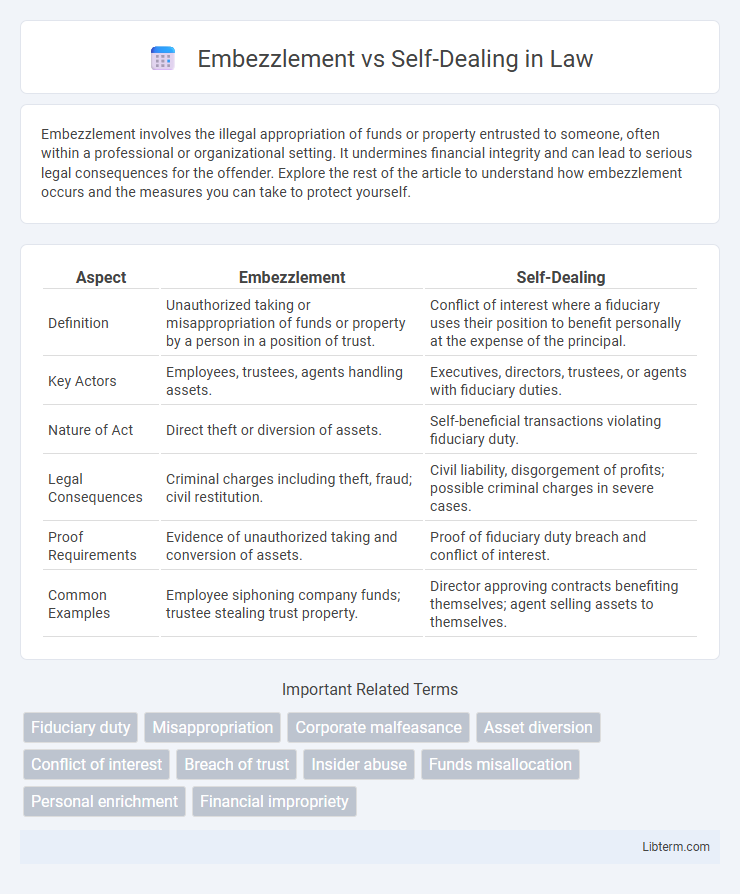Embezzlement involves the illegal appropriation of funds or property entrusted to someone, often within a professional or organizational setting. It undermines financial integrity and can lead to serious legal consequences for the offender. Explore the rest of the article to understand how embezzlement occurs and the measures you can take to protect yourself.
Table of Comparison
| Aspect | Embezzlement | Self-Dealing |
|---|---|---|
| Definition | Unauthorized taking or misappropriation of funds or property by a person in a position of trust. | Conflict of interest where a fiduciary uses their position to benefit personally at the expense of the principal. |
| Key Actors | Employees, trustees, agents handling assets. | Executives, directors, trustees, or agents with fiduciary duties. |
| Nature of Act | Direct theft or diversion of assets. | Self-beneficial transactions violating fiduciary duty. |
| Legal Consequences | Criminal charges including theft, fraud; civil restitution. | Civil liability, disgorgement of profits; possible criminal charges in severe cases. |
| Proof Requirements | Evidence of unauthorized taking and conversion of assets. | Proof of fiduciary duty breach and conflict of interest. |
| Common Examples | Employee siphoning company funds; trustee stealing trust property. | Director approving contracts benefiting themselves; agent selling assets to themselves. |
Definition of Embezzlement
Embezzlement is the fraudulent appropriation of funds or property entrusted to an individual for personal use, violating fiduciary duties. Unlike self-dealing, which involves conflicts of interest in transactions benefiting oneself, embezzlement specifically entails the covert misappropriation of assets. Legal frameworks categorize embezzlement as a criminal offense punishable by fines, restitution, and imprisonment.
What is Self-Dealing?
Self-dealing occurs when a person in a fiduciary position, such as a corporate officer or trustee, uses their authority to engage in transactions that personally benefit themselves at the expense of the organization or beneficiaries. This unethical practice involves conflicts of interest where the individual prioritizes personal financial gain over their duty of loyalty and care. Unlike embezzlement, which involves outright theft or misappropriation of assets, self-dealing typically involves deceptive approval of contracts or deals that favor the fiduciary's interests.
Key Differences Between Embezzlement and Self-Dealing
Embezzlement involves the unauthorized taking or misappropriation of funds or property entrusted to an individual, often by employees or fiduciaries, for personal gain. Self-dealing occurs when a person in a position of trust, such as a corporate officer or trustee, uses their authority to engage in transactions that benefit themselves personally, creating a conflict of interest. The key difference lies in embezzlement being a direct theft, whereas self-dealing involves abusing decision-making power to benefit oneself indirectly.
Common Examples of Embezzlement
Common examples of embezzlement include employees siphoning company funds, such as illicitly transferring money from business accounts to personal accounts or manipulating financial records to conceal theft. Other typical instances involve payroll fraud, where individuals issue fake employee paychecks, and vendor fraud, where payments are made to fictitious suppliers controlled by the embezzler. These actions contrast with self-dealing, which specifically involves individuals using their position to benefit personally through transactions directly related to their role or authority.
Typical Scenarios of Self-Dealing
Typical scenarios of self-dealing involve corporate insiders, such as executives or board members, using their position to benefit personally from company transactions or assets. Common cases include approving contracts with businesses they have a financial interest in, selling assets to the company at inflated prices, or diverting corporate opportunities for personal gain. This breach of fiduciary duty contrasts with embezzlement, which usually entails the outright theft or misappropriation of funds or property.
Legal Consequences for Embezzlement
Embezzlement involves the unlawful appropriation of funds by a person entrusted with those assets, resulting in criminal charges that can include fines, restitution, and imprisonment. Legal consequences for embezzlement often depend on the amount stolen, with penalties ranging from misdemeanor to felony convictions under statutes such as the Theft Act or state penal codes. Courts may also impose probation, asset forfeiture, and civil liability to recover misappropriated funds in embezzlement cases.
Penalties for Self-Dealing
Penalties for self-dealing often include hefty fines, restitution to the harmed parties, and potential imprisonment depending on the severity and jurisdiction. Courts may also impose civil sanctions such as disgorgement of profits, removal from positions of trust, and increased regulatory scrutiny. These measures aim to deter fiduciaries from exploiting their positions for personal gain, ensuring strict accountability and preservation of fiduciary duty integrity.
How to Detect Embezzlement in Organizations
To detect embezzlement in organizations, monitor discrepancies in financial records such as unexplained cash shortages or inflated expenses. Implement regular internal audits and use data analytics to identify unusual transaction patterns or unauthorized transfers. Establish strong internal controls, including segregation of duties and mandatory approval processes, to reduce opportunities for fraudulent activities.
Preventing Self-Dealing in Businesses
Preventing self-dealing in businesses requires robust internal controls such as clear conflict of interest policies, independent oversight by a board or committee, and thorough financial audits to detect any unauthorized transactions. Implementing transparent reporting mechanisms and regular employee training on ethical standards helps reduce the risk of self-dealing activities that can damage organizational integrity. Leveraging technology for transaction monitoring and ensuring compliance with corporate governance best practices further fortify defenses against both self-dealing and embezzlement schemes.
Embezzlement vs Self-Dealing: Summary and Final Thoughts
Embezzlement involves the unlawful appropriation of funds entrusted to an individual, typically violating fiduciary duties, whereas self-dealing refers to a conflict of interest where a fiduciary uses their position for personal gain. Both offenses constitute serious breaches of trust, but embezzlement is characterized by theft or misappropriation, while self-dealing centers on exploiting insider opportunities. Understanding these distinctions is crucial for legal accountability and designing effective corporate governance policies.
Embezzlement Infographic

 libterm.com
libterm.com